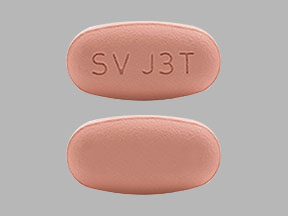
What is Juluca?
Juluca is a combination of dolutegravir and rilpivirine. Dolutegravir, rilpivirine, and other antiviral medications prevent the human immunodeficiency virus (HIV) from multiplying within your body.
The Juluca drug is used in the treatment of HIV (the virus that can cause the acquired immunodeficiency syndrome). Juluca does not cure HIV and AIDS. Only those who have been successfully treated for six months with another antiviral medication can use Juluca.
Warnings
Juluca taken during the first three months of pregnancy can cause birth defects. While using dolutegravir, use effective birth control methods to avoid pregnancy.
Before you take this drug
Juluca should be avoided if the user is allergic to rilpivirine or dolutegravir.
Certain medicines may have unwanted or harmful effects when combined with Juluca. If you are also taking
- Dofetilide
- John's Wort
- Dexamethasone is given in more than one dose.
- Carbamazepine, oxcarbazepine, phenobarbital, phenytoin;
- Rifampin, rifapentine,
- Esomeprazole, lansoprazole, omeprazole, pantoprazole, and rabeprazole.
Tell your doctor about any of the following to ensure that Juluca will be safe for you:
- Liver Problems
- Mental illness;
- A severe skin reaction or an allergic reaction caused by dolutegravir, rilpivirine, or both
- If you are also taking rifabutin,
Before starting the treatment, you may be required to take a pregnancy test. If you are pregnant, tell your doctor immediately.
HIV may be transmitted to the baby during pregnancy if it isn't controlled. Your name could be on a registry if you're pregnant to monitor the effects of any antiviral medication on your baby. To control HIV, take your medication as prescribed. Breast-feeding is not recommended for women with HIV/AIDS. The virus can be transmitted to your child even if it is not born with HIV.
Similar/related drugs
Biktarvy, Descovy, Truvada, Tenofovir, Atripla, Complera, and Stribild
How to take Juluca?
Follow all instructions listed on your prescription label, read all medication guides or instruction sheets and carefully read any labels attached with medications. Also read any information provided with your order as that could impact any interactions that might arise from taking such medicine. Take this medication with food only, never with meal replacement drinks. Blood tests will be required frequently.
You should not alter your medication or dose schedule without consulting your doctor. All people with HIV/AIDS need to be under the supervision of a physician. Refill your prescription before it runs out. Keep away from heat and moisture. Store the tablets in their original containers, as well as any packets or canisters of moisture-absorbing preserver.
Details on dosage
Adult dosage of Juluca to treat HIV infection:
Take 1 tablet once daily with food.
Use: As a complete regimen to treat HIV-1 infection and replace an existing stable antiretroviral regimen in those who are virally suppressed (HIV-1 RNA levels less than 50 copies/ml) over an extended period of time, this drug should be considered. At least 6 months with no history of treatment failure and no known substitutions associated with resistance to the individual components
What happens if I miss the dose?
As soon as possible, take the missed dose. If your next dose is approaching quickly, do not take extra medication to compensate for having missed one.
What happens if I overdose?
Call 1-800-222-1222 for poison help or seek immediate medical attention.
What should be avoided?
The medication does not stop you from spreading HIV. Share razors and toothbrushes. Speak to your doctor about safe methods of preventing HIV transmission while having sex. Even healthy people should never share syringes for drugs or medicines.
Side effects of Juluca
If you experience any of the following symptoms of an allergy to Juluca, stop taking it immediately and seek emergency medical attention: difficulty breathing or swelling in your lips, face, throat, or tongue.
If you experience a severe drug reaction, seek medical attention. Symptoms can include a skin rash or rashy skin, fever, swelling of the glands or muscles, weakness, or unusual bruises.
If you experience:
- Thoughts of suicide or harming yourself
- Anxiety, sadness, feeling hopeless;
- Depression: mood swings, low self-esteem, lack of interest in activities you used to enjoy, sleep disturbances, or thoughts of harming yourself.
- Liver problems: nausea, vomiting, and loss of appetite. Right-sided upper abdominal pain. Dark urine. Clay-coloured stool. Jaundice.
The immune system is affected by dolutegravir and rilpivirine, which can cause side effects even weeks or months later. You should tell your doctor about:
- Signs of an Infection: Fever, Night Sweats, Swollen Gland, Cold Sores; Cough, Wheezing, Diarrhoea; Weight Loss
- If you have difficulty speaking, swallowing, or moving your eyes, are weak, have a prickly sensation, or have balance problems, then this could be the cause.
- Impotence, menstrual irregularities, and swelling of the neck (enlarged thyroid) are all symptoms to watch out for.
Juluca can cause a variety of side effects.
- Headache
- Nausea, diarrhoea.
There may be other side effects. For medical advice on side effects, call your doctor. Report side effects by calling the FDA at 1-800-FDA-1088.
Interaction with other drug
Juluca can be less effective if taken with certain medicines. Take your medicine at least four hours before or six hours after taking the other medication.
- Antacids and laxatives containing calcium, magnesium, or aluminium, such as Maalox (Milk of Magnesia), Mylanta (Rolaids), Tums (and others), or ulcer medication sucralfate
- Buffering medicine
- You can also take calcium and iron-containing vitamin or mineral supplements (but only if they are taken with food).
You should take your Juluca dose 4 to 12 hours before you are due to take any of the following: cimetidine, nizatidine, famotidine, or ranitidine.
Dolutegravir can cause interactions with other drugs, so it is important to avoid taking them together. These include prescription, over-the-counter, vitamins, and herbal products. This medication guide does not list all interactions. Inform your doctor of all the medications you are currently taking and those that you will stop or start using.



